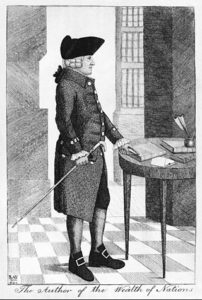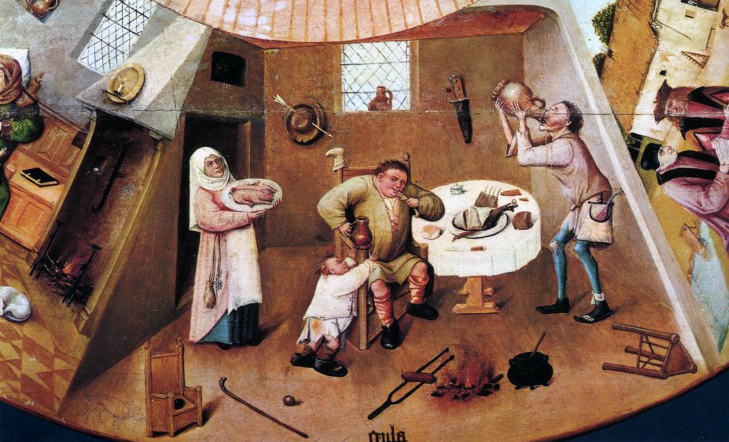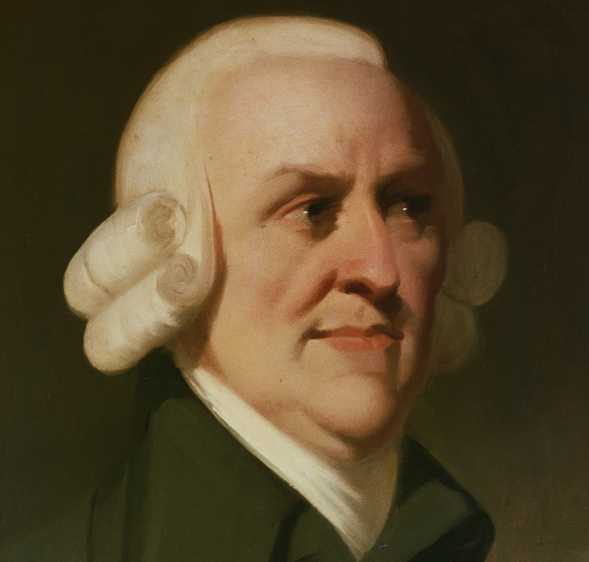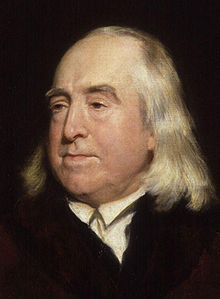Moreover, in Hitler’s view the war was by no means over. Germany was still the victim of international capitalism, whose continuing power he repeatedly attacked. He spoke of ‘international stock exchange and loan capital’ as the main ‘beneficiaries’ of the peace treaty. Ever since the ‘collapse of the Reich’, Hitler claimed, the country had fallen under ‘the rule of international, fatherlandless capital, independent of person, place and Nation’. [emphasis by Ed.]
 Left, portrait of Adam Smith by John Kay. Considered by some as ‘The Father of Economics’ or ‘The Father of Capitalism’, Smith, who popularised the idea that capital has no flag, wrote The Wealth of Nations in 1776 (look at the year of publication of his magnus opus!).
Left, portrait of Adam Smith by John Kay. Considered by some as ‘The Father of Economics’ or ‘The Father of Capitalism’, Smith, who popularised the idea that capital has no flag, wrote The Wealth of Nations in 1776 (look at the year of publication of his magnus opus!).
Except for the European Tom Sunic and the American Michael O’Meara, it strikes me that the bulk of white nationalist pundits have been blinded to see something so obvious: that, without a flag, sooner or later the Anglo-Saxon economic system was going to betray their ethnicity.
This is compounded in the American myth of those who emigrated fantasising about a city on a hill, self-understanding themselves as the new Israelites to the extent of admiring the real Jews and rolling out the red carpet to them in subsequent centuries. Why, unlike O’Meara and Sunic, can the racial right not see that they, along with the rest of the Anglo-Americans, have been empowering the enemy through this fatherlandless, flagless capitalist ideology? Hitler did get it:
International conferences—such as Genoa in April 1922—were simply condemned as ‘stock exchange conferences’. Hitler saw Jewish international capitalism and western democracy as linked. ‘International Jewish stock exchange capital, ‘he believed, ‘was the driving force of these western-democratic states.’ He set up the ‘equation’ of ‘democracy-capitalism-Jew’. For all these reasons, he argued, National Socialism was a ‘new force whose aim could always only be anti-capitalist’.
Hitler was not completely opposed to all forms of capitalism, though he sometimes gave that impression. He contrasted the blanket hostility of Social Democrats and Marxists to capitalism in general with his own distinction between allegedly pernicious and largely Jewish ‘international loan capitalism’ and nationally oriented ‘productive industrial capitalism’.
‘Factories and industrial capital,’ he told an audience of SA, ‘is national’ and ‘the capital of every country remains national’. For clarity, he stressed that National Socialism ‘struggled against every form of big capital, irrespective of whether it is German or Jewish, if it is grounded not in productive work, but in the principle of interest, of income without work or toil’.
Moreover, Hitler added, the NSDAP ‘battled the Jew not only as the sole bearer of this [form of ] capital’, but also because he ‘prevented ‘ the ‘systematic struggle’ against it. In Hitler’s view it was the determination of international capitalism to subjugate independent national economies which had led to the world war and the brutal peace settlement. This was the context in which he interpreted Allied attempts to control the Reichsbahn, the German national railways. Hitler accused the Jews of trying to ‘grab’ them, as part of a policy whose ‘final aim was the destruction of our national economy and the enslavement of our workforce’.
The Allied determination to annihilate Germany, Hitler believed, was demonstrated by their continuation of the blockade after the end of hostilities. ‘One wants to destroy us completely,’ he claimed, ‘one wants to make our children sick and to allow them to waste away’…
‘The Entente,’ he lamented, ‘advises us to emigrate in order to feed ourselves, and to make way for the Eastern Jews.’ Hitler, in other words, feared that Germany would become the victim of what is today called ‘population replacement’.
He frequently urged his audience to think of the ‘thousands of German emigrants’. This was the great trauma underlying Hitler’s whole world view: the continued haemorrhaging of the best elements of the Reich who had left the Fatherland in order to enlarge the population of Germany’s rivals, with the fatal results that had been seen in the Great War. Worse still, he argued, these best elements were being replaced by the Jewish dregs of central and eastern Europe in a kind of negative selection, designed to further undermine the racial coherence of the German people.


